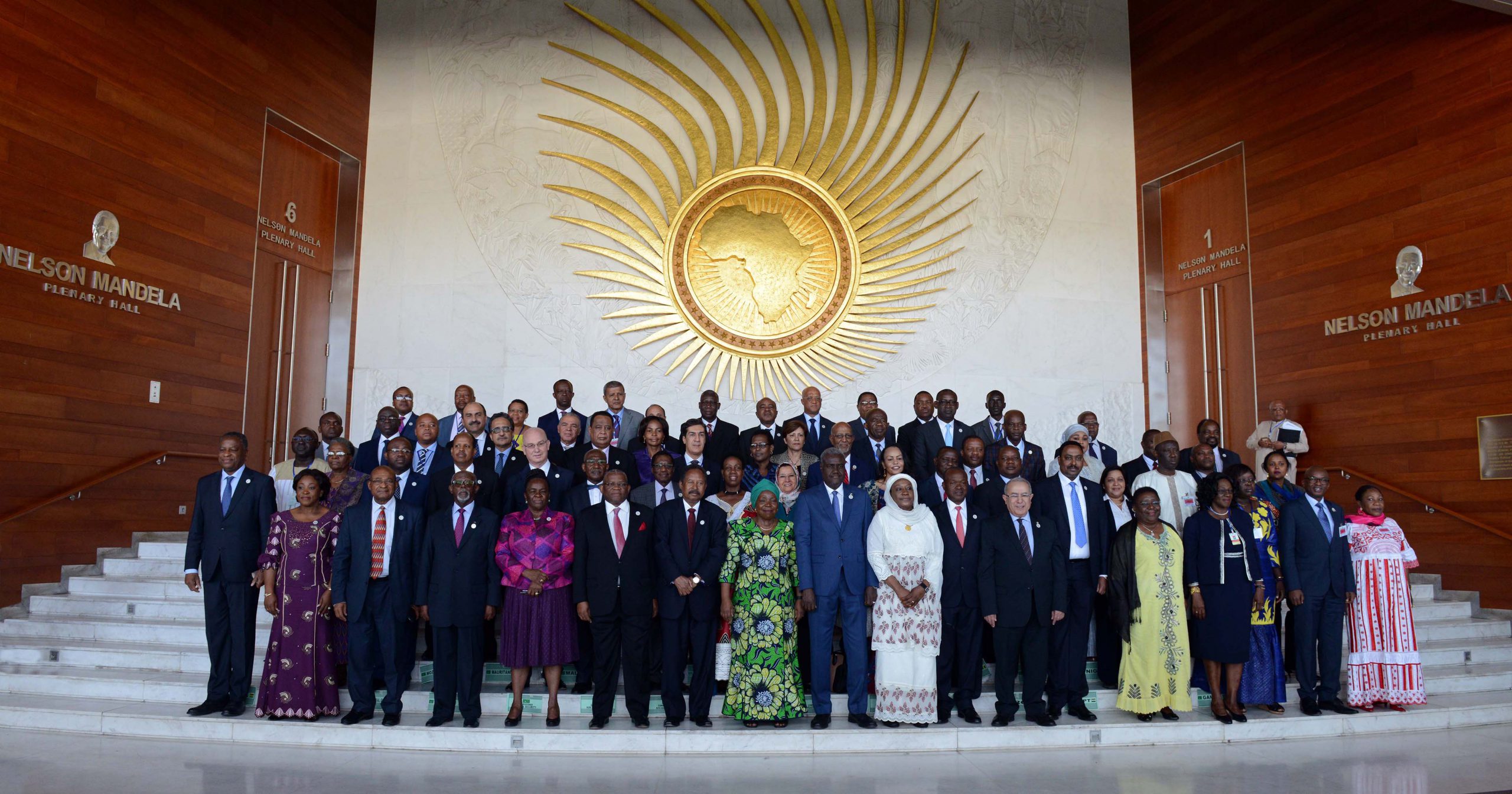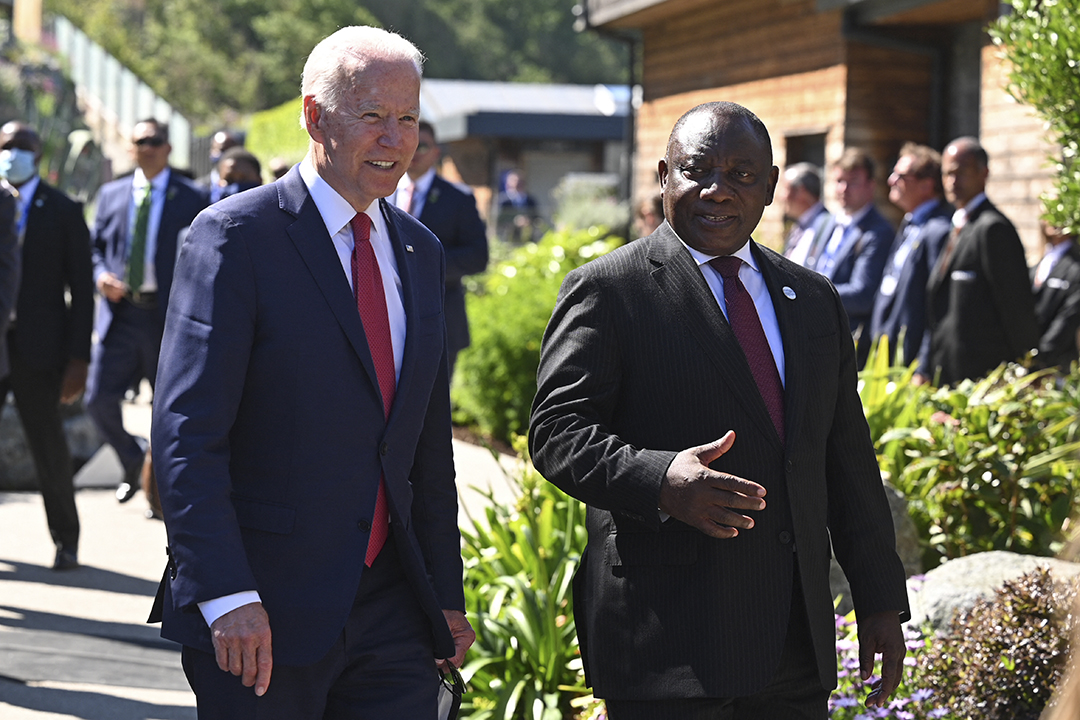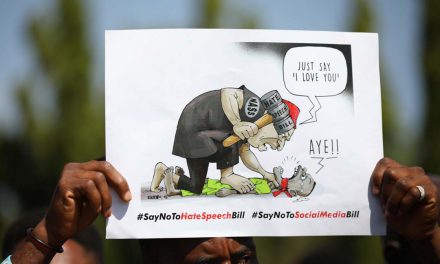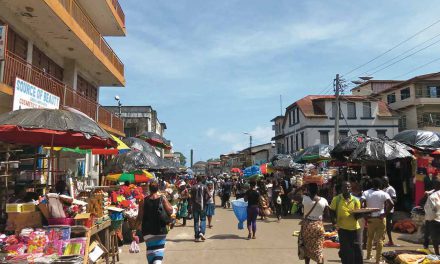A call for an African policy framework for its relations with America
This article argues the case for an African policy framework with regards to the United States of America, as a strategic approach to redressing the many areas of asymmetry in relations. The absence of a coherent African policy or policies towards the US, against the background of past American policies towards Africa, is partly accountable for Africa’s poor socioeconomic performance vis-à-vis the US.

African Union Executive Council at AU headquarters , Addis Ababa, Ethiopia, 2017. Photo: Government ZA
In more respects than one, early predictions that the US elections would be messy were proven right. From the intemperate first presidential debate in September 2020 between then Democratic Party candidate, Biden, and the then incumbent and Republican Party candidate, Donald Trump, to the storming of the US Capitol building in Washington DC, it was evident that the US was a democracy under siege. After a series of controversies amid the new coronavirus pandemic, Biden won the 3 November, 2020 elections. This ushered in renewed optimism for the reinvigoration of Africa-US relations following the low level to which Africa-US engagements had sunk during Trump’s presidency.
The fact that public interest in the landmark elections remained high across Africa was an indication that Africans had taken note of and cared about developments in the US. Indeed, broad public animation took forward-looking analyses and proposals after the 20 January, 2021. inauguration of Biden as president and Kamala Harris as vice president. Again, a Google search of the phrase, “The Biden administration and Africa”, returned 42 million items in less than a minute, indicating that the discussion had progressed from electoral challenges to strategies on African stakes in the still relatively new administration. Media headlines that speak to the yearning for a policy framework regarding Africa and the US include: “The United States returns to Africa” by the American think tank Foreign Policy; “The end of apathy: The new African policy under Biden” by the German Institute for Global and Asian Studies, and “Biden’s Africa blueprint copycats China’s policy for continent”, by the Chinese international media organisation Global Times.
That think tanks and intellectuals around the world are focused on the Biden-Harris administration’s approach to Africa speaks volumes about the importance of Africa, not only to the US but to the rest of the world. These debates and discussions, however, raise questions around Africa’s place in the discussions. To what extent, for instance, are Africans going beyond lip service to develop a policy framework towards the US? For, it is one thing to yearn for a policy reset from Washington DC towards the continent, and another thing altogether for Africa to develop a policy framework towards the US.
Fortuitously, the unrelenting curiosity in American electoral politics provides an opportunity for scholars and intellectuals focused on Africa-US relations to fill extant gaps and imagine new opportunities for coherent and mutually beneficial policy engagements. The absence of a coherent African policy position towards the US has long been identified as one of the factors impeding the continent’s productive engagement with a global power whose foreign policy is so impactful on Africa’s cultural, political, economic and security interests. Addressing this gap and exploring new opportunities for recalibrating and strengthening Africa-US ties requires new thinking and a proper understanding of the issues at play. This would help in laying the foundation for transforming the asymmetrical nature of Africa-US relations for the mutual benefit of both parties. Failure to seize this opportunity would be a missed opportunity for Africa to shape policy discourse towards the US.
What, therefore, are some of the potential ingredients for an African policy framework towards the US? Posing this question raises supplemental questions and issues. As has been debated in intellectual circles over the years, the US is a fairly homogenous entity, although the clashes and conflicts witnessed in the recent past indicate that the country is not in perfect harmony. On the other hand, Africa is a much more heterogeneous entity, comprising 55 nations each with their own claim to sovereignty. However, there are many factors of African homogeneity, including the spirit of Pan-Africanism and a shared history of colonial subjugation, to mention but two.
Even though the African Union (AU) is often denigrated as a toothless dog that barks without biting, the fact that the organisation is in place, implementing supra-continental policies such as Agenda 2063 being implemented through programmes such as the African Continental Free Trade Area, is evidence enough of some form of continental homogeneity. Indeed, a continental policy framework towards the US could serve to further strengthen the proclivity of the continent to unite.
At the same time, however, it has been appreciated that the continent is made up of regional economic communities, which ultimately illustrates close historical and cultural affinities within regions. The most visible communities in these respects are the Arab Maghreb Union, the Community of Sahel-Saharan States, the Common Markets of Eastern and Southern Africa, the East African Community, the Economic Community of Central African States, the Economic Community of West African States, the Inter-Governmental Authority for Development, the Southern Africa Development Community, and the Southern Africa Customs Union. The African diaspora has in recent years also been considered a region of the continent. It is clear that tensions often arise between nations in these organisations and regions. Nonetheless, focusing on the problem areas within these regional organisations misses the point that they have had some successes in addressing issues within their geographical areas. It is therefore feasible that a continental policy framework towards the US can take both a continental approach and a regional approach.

US President Joe Biden with South Africa’s President Cyril Ramaphosa as they attend the G7 summit in Carbis Bay, Cornwall on June 12, 2021. PHOTO Leon Neal/POOL/AFP
In the debate over continent-wide, regional, and nation-specific policies, it must be reckoned with the fact that African nations have direct and bilateral relations with the US, as seen in diplomatic and ambassadorial representation. For instance, while African nations congregate as collectives at the AU and at the regional level, they also have their own interests, pursued under national foreign policies. While it may seem contradictory for nations to develop and articulate individual policies towards the country, while pushing their own agendas towards the US, a closer analysis can show that the contradictions can be managed. An approach in this direction would be one in which a framework is developed at the continental level and adopted at the regional and national levels. Towards this end, Agenda 2063 – which has commonalities with the United Nations’ Agenda 2030 and is the foundational document for the African Continental Free Trade Area – could serve as a starting point. The question would then be, how can Agenda 2063 and its 10-year plan be interpreted from the point of view of Africa’s collective, regional and national interests in the US? The key point is that continental policies ought not to preclude regional policies and the latter need not be a reason for dispensing with national policies. After all, regions such as the Association of South East Asian Nations (ASEAN) have regional engagements with the US while at the same time, specific nations such as Vietnam, Malaysia and Thailand have bilateral engagements too.
From the foregoing, it is feasible to think of an African policy framework towards the US as incorporating common positions and principles that can be agreed on at continental, regional and national levels. In this scheme of things, some leeway would be allowed for the continent, regions and nations to craft policies that would address their specific interests. Thus, the geographical negotiation in developing the framework would serve a horizontal purpose, while the specific issues across economics, culture and politics inform vertical interests. For instance, nations endowed with mineral and extractive resources such as Democratic Republic of Congo,
South Africa and Nigeria might have different priorities from nations that rely more on agriculture and services such as Kenya, Ethiopia and Rwanda. The unifying factor would still be that principles of fair trade across the productive sectors are the guiding light for the engagements.However, the geographical starting point to African policies towards the US does not comprehensively address the crucial issue of the analysis that would go into their formulation. Over the past couple of weeks and months, there has been a vibrant debate on the continuities and discontinuities of the US policy towards Africa under the Biden-Harris administration. Intellectuals have offered probabilities and hypotheses across policy issues ranging from trade and economics to geopolitics and constitutionalism, democracy and human rights; defence, military, deradicalisation, counter-terrorism, peace, and security; and environment and climate change, among others.
Such policy analysis efforts are useful as they would provide information on the direction that the Biden administration is taking as a prerequisite to a policy response from Africa. However, a focus on what the US does towards Africa should not be the core of the continent’s foreign policy formulation. African intellectuals have debated the concept and practice of African agency for many years. An African policy strategy towards the US provides an opportunity for Africans to use the agency they possess to propose clear interests towards the US, thereby opening an opportunity for negotiation. After all, the politics of policy development demand that a party looking to develop mutually beneficial relations should begin at home, with their own interests, before setting out to negotiate with the other party. In other words, Africa should approach the US as an actor rather than waiting to be acted on. Perhaps a fundamental question in the whole issue of Africa’s policy towards the US is the question of who should develop it.
Just which actors and communities would be most strategic and proactive in shaping Africa-US engagements and the terms of engagement in the coming decades? It is easy to quickly conclude that policymakers, especially those from governments, should lead the way. However, as it has been pointed out, in some respects, government officials – who are often politicians or closely allied with political classes – may be more of an impediment to policy formulation than being facilitators. For instance, if an African policy framework towards the US is strong on issues of democracy and human rights, illiberal regimes on the continent might not sign on it.
Also, governments may not necessarily have the intellectual tools to undertake the odious job of analysing documents and scenarios. Indeed, intellectuals working within academic institutions, civil society organisations and the private sector may be more proximate to the issues that need to be analysed in the course of policymaking. At the same time, however, a policy framework towards the US might not take off if governments dismiss it or stall implementation. All this suggests the need for building consensus on an agenda for engagement, drawing on informed knowledge, diplomatic experience, and expertise in various fields. Policy formulation and plans of action at the state and non-state levels, and at bilateral and multilateral levels, will require strategic consultation, networking and mobilisation. Africans will have to provide leadership for the project of building a coherent continental policy for engaging the US in a competitive and rapidly changing world order.
Dr Bob Wekesa is acting director and research and communications coordinator at the African Centre for the Study of the United States based at the University of the Witwatersrand, South Africa. He holds a Bachelor’s degree from the University of Nairobi and Master’s and doctoral degrees from the Communication University of China, Beijing. His area of teaching, research and public engagement is the intersection of journalism, media, and communications on the one hand and geopolitics, diplomacy and foreign policy on the other. He supervises post-graduate projects in these fields. His current research work includes international communication; diplomacy with a focus digital and public diplomacy; African diaspora; the internationalisation of African cities; the geopolitics of Africa and established and emerging powers. Prof Wekesa is well published in academic and popular platforms.












